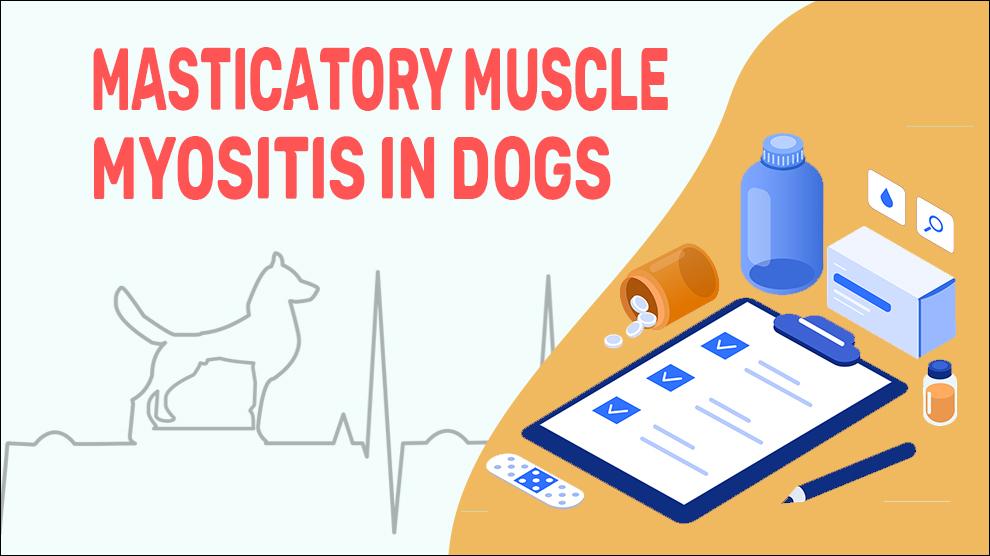Masticatory muscle myositis (MMM) is a focal, autoimmune, inflammatory myopathy in which the dog’s immune system targets the dog’s own muscles of mastication (temporalis, Medial/lateral Pterygoid, masseter, and digastricus).
The masticatory muscles are the muscles involved with chewing and grinding to enhance the eating process. MMM affects jaw muscles causing pain and swelling. Dogs with MMM are unable to open their mouth (trismus) without agonizing pain. They cannot drink, eat, or pick up food or toys.
MMM can be acute or chronic and unilateral (one side) or bilateral (two sides). MMM requires early detection because treatment is most successful when initiated in the early phase. Sadly, most owners do not distinguish the problem it becomes severe, which is characterized by marked Loss Of Muscle Mass (temporalis and masseter muscles).
While MMM was once thought to be a form of polymyositis, further research has confirmed that the disease represents a very unique inflammatory myopathy (or muscle disease).
Symptoms Of Masticatory Muscle Myositis
- Painful swelling of the temporalis and masseter muscles
- Fever
- Difficulty moving the jaw
- Difficulty breathing
- Difficulty drinking
- Difficulty eating or picking up food
- Fibrosis
- Unable to open the mouth (trismus)
- Sunken/protruding eyes (exophthalmos)
- Regurgitation of food and water
- Weakness
Treatment Options For Masticatory Muscle Myositis
- The short-term treatment plan is Immunosuppression: Corticosteroid Administration.
The acute phase should be treated properly, or else it can progress to the chronic phase.
Prednisone at 2 - 4 mg/kg PO (4 to 6 months, with no more than a 50% decrease in the dose every month).
After which a minimal maintenance dose to subside clinical signs is enough.
Azathioprine: 2 mg/kg PO q24 then 48h.
Leflunomide: 2-3mg/kg PO q24h.
Mycophenolate: 10mg/kg PO q12h.
Cyclosporine (Immunomodulator): 5mg/kg PO q12h.
Colchicine: Antifibrotic properties.
- Once the disease gets controlled, the focus will be shifted toward the long-term goal. The medications are gradually reduced and in due course, completely free your dog from all medications. However, in most cases have a need for a minimal dose of medication.
- Some dogs may require physical therapy depending on the disease severity. Physical therapy is done to teach correct chewing and swallowing habits.
- Surgery: This is for severe cases of MMM and it is the last resort option. A small part of the front jaw is removed to let your dog gulp water and food with the tongue.
Home Remedies For Masticatory Muscle Myositis
- Never try to force open the jaws as this can damage or even displace their jaw.
- Encourage the pets to use chew toys and other activities to give more exercise to their jaws.
- Your veterinarian may prescribe the proper food regimen required to keep your pet as healthy as possible.
Prevention Of Masticatory Muscle Myositis
Early detection is the only way of prevention.
When detected early, Masticatory muscle myositis can be treated successfully but make sure to follow the treatment plan that your vet prescribes for your dog.
Check with your veterinarian for post-treatment testing and follow-up visits to make certain that the condition is well under control.
Affected Breeds Of Masticatory Muscle Myositis
Golden Retriever, Doberman Pinscher, German Shepherd, Labrador Retriever, Cavalier King Charles Spaniel, Rottweiler, Weimaraner, Large Dog Breeds
Additional Facts For Masticatory Muscle Myositis
Causes:
- Hereditary: Some dogs may be predisposed genetically to MMM.
- Suspected triggers of MMM include:
- Bacterial and/or viral infection
- Trauma
- Exposure to allergens/ environmental toxins
- Idiopathic: the actual trigger of MMM is not known
Morbidity:
- Masticatory muscle myositis median age of onset: 3 years of age.
- Puppies as young as 4 months of age have been reported.
- The disease has a predilection for large-breed dogs.
Diagnosis:
- 2M antibody assay (2M muscle fibers antibodies).
- Serum biochemistry profile(creatine kinase (CK), AST, and globulins).
- Muscle biopsy (severity of pathological changes).
- EMG - myositis of the muscles.
- Radiography ( to rule out Disorders of the temporomandibular joints).
Mortality:
MMM is not potentially life-threatening and there is no documented mortality rate.
Prognosis:
With early detection, masticatory muscle myositis carries a favorable prognosis, although it is a difficult disease to manage. Relapses occur rapidly so treatment should not be discontinued prematurely.
When To See A Vet
Contact your vet right away, if you notice any of the following:
- Painful swelling of the temporalis and masseter muscles.
- Unable to move the jaw.
Food Suggestions For Masticatory Muscle Myositis
Nutritional Management:
Semi-liquid diets:
Soups: Broths, chicken soup/stew, fish stew.
Meat: Mild, pureed meat or chicken in mousse form or thin meat purees mixed in soups.
Bread, cereals, Pasta (white, without sauce) - small amounts.
Eggs: In dairy beverages.
Fruits: Mashed fruits, thin purees, and strained fruit juice.
Vegetables: Thin purees, mixed in soups or not.
Conclusion
The prognosis is determined by the clinical response to immunosuppression and the degree of fibrosis present. Generally, early detection during the acute phase and aggressive treatment results in a good prognosis.
There is marked atrophy and fibrosis in cases where the diagnosis is not done correctly. Inadequate immunosuppression and hasty discontinuation of corticosteroids result in Treatment failure and relapses.
The chronic phase of the disease carries a more guarded prognosis but it can be good if there is no persistent jaw dysfunction.
Surgery for dogs will have an uncertain prognosis due to severe muscle scarring.

















